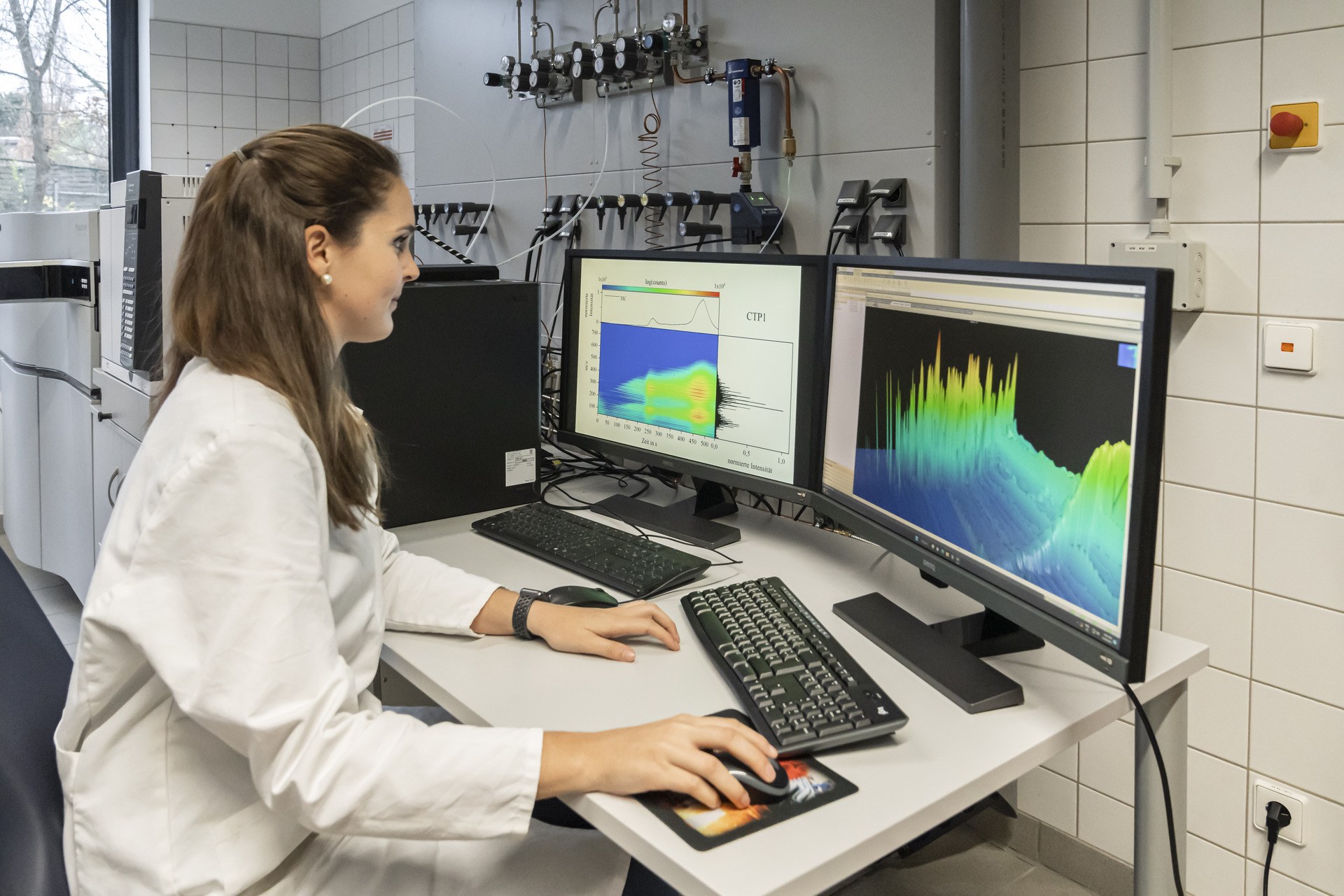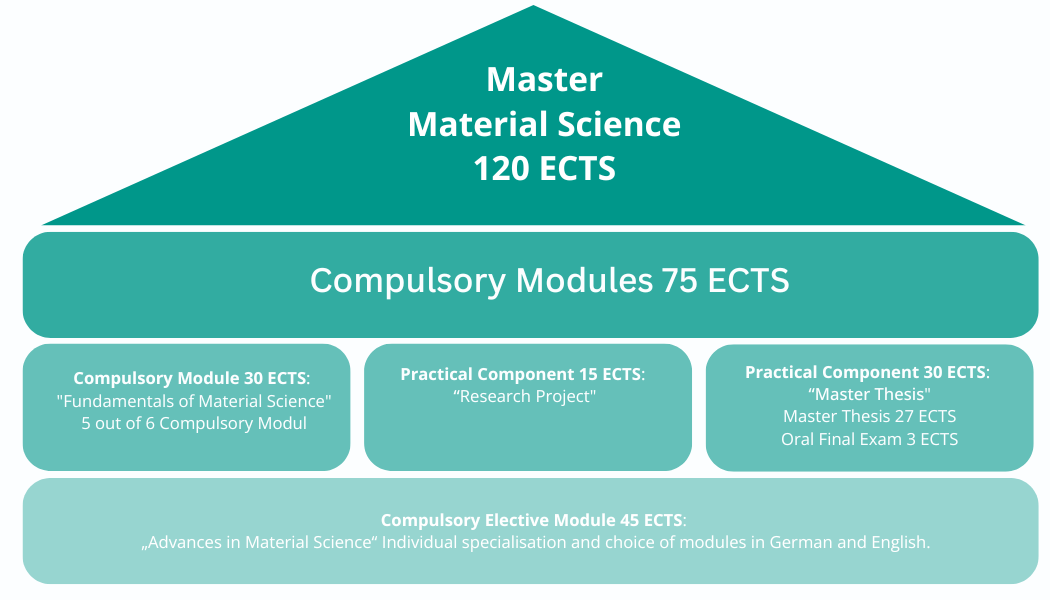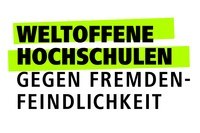
Material Science starting from Winterterm 2025/26
Master of ScienceOverview
Attention!

The previously offered Master's programme "MSc Applied Natural Sciences" has been revised and accredited in terms of title, study structure and duration. The contents of the new study programme are listed below.
The model shown on this profile will be offered from the coming winter term.
| Degree | Master of Science | ||||
| Standard period of study | 4 | ||||
| Start of programme | Summer semester Winter semester | ||||
| Application deadline for summer semester | |||||
| Application deadline for summer semester for internationals |
| ||||
| Application deadline for winter semester | |||||
| Application deadline for winter semester for internationals |
| ||||
| Teaching language | English German | ||||
| Admission restriction | no | ||||
| Admission requirements | BSc in Applied Natural Sciences conferred by Universität Koblenz or equivalent degree (final grade 2.5 or better). The board of examiners decides on any exceptions on the basis of applications submitted. Exceptions in this regard are a Bachelor's thesis with the grade 1.5 or better or professional experience of at least one year in the field of chemistry and physics of functional materials. Prerequisites include basic and application-oriented knowledge in higher mathematics, classical physics (mechanics, thermodynamics, electrodynamics, optics), modern physics (atomic and molecular physics, quantum mechanics), as well as general and inorganic chemistry, solid-state chemistry, classes of substances, reaction mechanisms in organic chemistry, and states of matter in physical chemistry. |
Contents and structure

The Master’s programme "MSc Material Science" is a research-oriented study programme that imparts subject-specific and interdisciplinary knowledge, skills, and methodological expertise in the physics and chemistry of functional materials. It prepares students for further academic qualifications (such as a doctorate) or for careers in fields related to materials science. The programme comprises 120 ECTS credits and has a standard duration of four terms. This internationally oriented Master's programme is taught in English in both compulsory and compulsory elective areas.
In the compulsory area, "Fundamentals of Materials Science", you are required to choose 5 out of the following 6 modules:
- Ceramic Materials
- Sustainable Functional Materials
- Polymer Chemistry and Natural Products Chemistry
- Physics of Metals
- Polymer Science
- Surface Science.
The elective area, "Advances in Material Science", is divided into modules taught in both German and English, totaling 45 ECTS credits. All students must take a cross-disciplinary compulsory module called "Recent Research Topics", focusing on current scientific issues in the field of materials science.
All compulsory and elective courses emphasize sustainability aspects in the respective subjects, with this theme being central to the module "Sustainable Functional Materials".
Academic advising is recommended after the first semester to help guide you efficiently through your academic path.
Further modules for the elective component include, for example:
- Physics of Matter
- Thermochemical Modeling
- Applied Theoretical Physics
- Special Topics and Methods in Material Sciences 1 and 2
- Analytical Chemistry
- Technical Chemistry
- Biochemistry
- Catalysis
- Organic Synthetic Chemistry
- Glass Materials
- Structure of Substances 1 and 2
- Nuclear Medicine, Computer Tomography and X-Ray Diagnostics
Prospects
As a graduate, you will gain in-depth scientific knowledge, both theoretical and practical, that will qualify you for demanding roles in the field of materials science. Specifically, you will be well-prepared for an academic career in natural science research, as well as for challenging administrative and industrial positions in sectors related to chemistry, physics, and materials science.
With courses taught in English and the opportunity for study stays at partner universities abroad, the programme will prepare you for a dynamic, international career.
Thematically, the Master's programme is designed as a direct pathway to a doctorate in the field of materials science (metals, ceramics, plastics) within the faculty. In this regard, the doctoral network CerMaX provides an excellent platform for doctoral students to connect and develop both scientific and practical aspects of ceramics. The programme also includes soft skills training, mentoring, and the opportunity for research stays with international advisory board members.
Semester abroad
The elective “Mobility Module”, worth 5–30 ECTS credits, allows you to incorporate courses from accredited study programmes outside the university — for example, during a stay abroad or at partner institutions.
Research cooperations
We have cooperation agreements with several universities and research institutes in Germany and abroad, including in the USA, France, China, Chile, Italy, Morocco, and Spain.
Thanks to our international academic and research staff, as well as regular guest lectures from abroad, you’ll be encouraged to engage in a truly international environment every day.
Applicants with foreign university entrance qualifications
Please find out more about the separate application process under International and Apply Now!
Due to the long visa application process, we strongly advise non-EU students to apply for the summer semester by 15 November and for the winter semester by 15 May.




